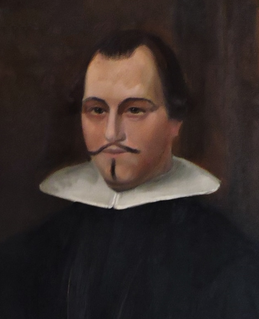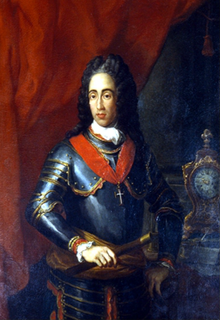
English Tangier was the period in Moroccan history in which the city of Tangier was occupied by England as part of the English colonial empire from 1661 to 1684. Tangier had been under Portuguese control before King Charles II acquired the city as part of the dowry when he married the Portuguese infanta Catherine. The marriage treaty was an extensive renewal of the Anglo-Portuguese Alliance. It was opposed by Spain, then at war with Portugal, but clandestinely supported by France.
Menezes, sometimes Meneses, was originally a Portuguese toponymic surname which originated in Montes Torozos, a region in Tierra de Campos, northeast of Valladolid and southeast of Palencia. The ancestor of the Meneses lineage was Tello Pérez de Meneses. The family wealth and power grew remarkably in the 13th and 14th centuries, through several marriages with the Castilian and Portuguese royal families.

Avintes is a Portuguese civil parish in the municipality of Vila Nova de Gaia. The population in 2011 was 11,497, in an area of 8.82 km².
Luis de Almeida can refer to:

Marquis of Vila Real was a Portuguese title of nobility created by a royal decree, dated from 1 March 1489, by King John II of Portugal, and granted to Dom Pedro de Menezes, also known as Peter II of Menezes, 3rd Count of Vila Real.

Count of Alcoutim was a Portuguese title of nobility, subsidiary to the one of Marquis of Vila Real, created by a royal decree, dated from November 15, 1496, by King John II of Portugal, and granted to Dom Fernando de Menezes, also known as Ferdinand II of Menezes, 2nd Marquis of Vila Real, 4th Count of Vila Real and 2nd Count of Valença.

Count of Valença was a Portuguese title of nobility, created by a royal decree, dated from July 20, 1464, by King Afonso V of Portugal, and granted to Dom Henrique de Menezes, who was already 3rd Count of Viana and 4th Count of Viana.

Dom Duarte de Menezes, was a 16th-century Portuguese nobleman and colonial officer, governor of Tangier from 1508 to 1521 and 1536 to 1539, and governor of Portuguese India from 1522 to 1524.

Pedro de Menezes Portocarrero, was a 15th-century Portuguese nobleman and military figure. Pedro de Menezes was the 2nd Count of Viana do Alentejo, 1st. Count of Vila Real and the first Portuguese governor of Ceuta.

Dom Duarte de Menezes, was a 15th-century Portuguese nobleman and military figure. Duarte de Menezes was the 3rd Count of Viana do Alentejo, 2nd Count of Viana, Lord of Caminha and the first Portuguese captain of Alcácer-Ceguer.
Fernando de Castro was a 15th-century Portuguese nobleman, diplomat and military figure. Fernando de Castro was the 1st Lord of Paúl de Boquilobo. He was a member of the royal council of John I of Portugal, and governor of the household of Prince Henry the Navigator.

Fernando de Meneses, 2nd Count of Ericeira, was a Portuguese nobleman and military man. He was Governor of Tangier until 1661.

The Forty Conspirators were a Portuguese nationalist group during the Iberian Union. The Conspirators were composed of forty men of the Portuguese nobility, and many clergy and soldiers. Their goal was to depose the House of Habsburg king, Philip III.

The Count of Sabugosa, was a title created by letter on 19 September 1729 by King John V of Portugal for Vasco Fernandes César de Meneses and his descendants.

D. Luís Carlos Inácio Xavier de Meneses, 1st Marquis of Louriçal, 5th Count of Ericeira,, was a Portuguese nobleman and statesman, that served as Viceroy of India twice.
Count of Redondo was a Portuguese title of nobility created by a royal decree, in 1481, by King Manuel I of Portugal, and granted to D. Vasco Coutinho, the son of Fernando Coutinho, Marshall of Portugal.
D. Luis de Almeida, Count of Avintes, was a Portuguese nobleman and military man, Governor of Rio de Janeiro and, later the last Portuguese Governor of Tangier.
José Guedes de Carvalho e Meneses was a Portuguese colonial administrator. He was born on 19 May 1814 in Mancelos in northern Portugal. He was created Count of Costa by King Luís I in 1875. He was an older brother of Vasco Guedes de Carvalho e Meneses who was governor of Angola, Mozambique and Cape Verde.










